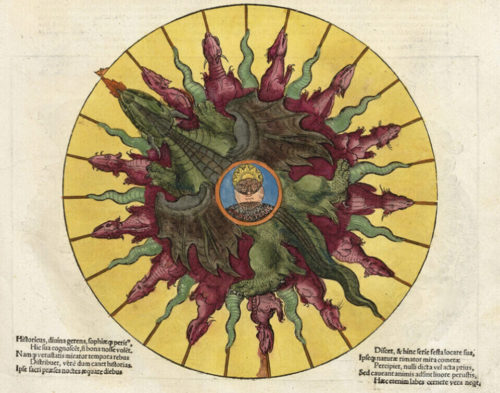
Petrus Apianus’s Astronomicum Caesareum, 1500s, Germany.
“Death is not an event in life: we do not live to experience death.”
Ludwig Wittgenstein (Tractatus)
“The mind that knows must of necessity have a past.”
Gaston Bachelard (The New Scientific Spirit)
“ It is said that astronauts returning from space carry with them a changed perspective on the world, the “overview effect,” in which, having seen the Earth from above, they can fully perceive how fragile our little oasis is and how unified we ought to be as a species, as perhaps the only thinking beings in the cosmos.”
Katie Mack (The End of Everything)
There is a famous and often quoted remark of Einstein’s that goes like this: *the distinction between past, present and future is only a stubbornly persistent illusion*. The question of ‘time’ is one of the great mysteries of existence. As is the question of ‘consciousness’. The Oxford dictionary defines *time* this way:
“what is measured in minutes, hours, days, etc. The world exists in time and space. The changing seasons mark the passage of time.”
The Merriam Webster dictionary defines it this way: “the measured or measurable period during which an action, process, or condition exists or continues : DURATION.”
“Wittgenstein makes, in his lecture held at Cambridge in 1932–1933, a relevant distinction between what he calls ‘memory-time’ and ‘information-time.’ If the first can be understood as a now-centered system mostly expressed by indexical sentences or as an arrangement relied on memory, and therefore inadequate to give any external physical criteria for time measurements, the second clearly refers to a public chronology, implemented by clocks, calendars, diaries, and so on.”
Giorgia Rizzo (Wittgenstein on Time: From the Living Present to the Clock Time)
My concern though, is more with how humanity has, for the most part (and maybe nearly entirely) stopped asking questions about the basic mysteries of existence. The contemporary westerner is probably the least existential population in the history of the world.
In one sense, if we think of the past, present, and future as an illusion, and we restrict this thinking to ‘mind’, to our minds, it is not an impossible idea. But, we are trapped in a corporeal body, we are trapped in something we call a body, and that body is bestowed with an identity to which we cling with profound tenacity. And that body eventually stops operating. And here is the greatest of all mysteries, death. But ‘mind’ is a very vague idea. And what does it mean to write ‘my mind’ as I did above. It suggests the mind/body problem: when I say ‘my mind’ am I referring to that which is housed inside my cranium. It occurs to me that *time* isn’t an idea that necessarily had to arise. At least not the abstract memory time (per Wittgenstein). I understand the pragmatic necessity of *information time*. So it seems possible that *memory time* was the child of *information time*. The rejoinder to that is *death*. Time is anchored to death. Time is that which ends, when it ends for us. Eternity is that which violates our ending. My thoughts, produced by my *mind*, are of necessity always going to be joined at their root or core to my mortality.

Paccarik Orue, photography.
“It was the civilization in which the invisible prevailed over the visible. Like few others, it was liable to be misunderstood. There is no point looking for help from historical events, since there is no trace of them.”
Roberto Calasso (Ardor)
Calasso is writing about the Vedas. And there are so many threads here already. The Vedas employed sacrifice, and that will take one into a long tunnel worthy of exploration, but there is also Soma, the unknown intoxicant the ancient Vedas employed, and of which they eventually ran out. But before that, and before a discussion of language and then, even more importantly, stories, there remains consciousness. And looming at the end of this entire discussion is death.
For the Vedas, whose entire culture was built around ritual, the enacting of ritual in fact consumed the entire society . And not just ritual but impossibly Borgesian rituals, the idea behind both sacrifice and other rituals remains obscure. If not utterly opaque. Except there are glimpses, like that which David Shulman relates (NY Review of Books, 2015 At the Heart of Hinduism)
“When the Vedic ritualist performs the sacrifice, his patron ascends—literally—to the world of the gods, defined as the domain of truth. He does not, however, want to remain there. He wants to live a long life on earth. Each time he ascends to heaven, he creates another small part of what will become his daiva ātman, his “divine self-body” that will patiently await his arrival there after death.”
It is a bit like seeing worldly reality through the ideas of avatars. WE are our own avatars. If the Vedic ritual were inverted, anyway. And today’s screen rituals, or compulsive repetitive actions, may serve as a diluted form of divine self-body.
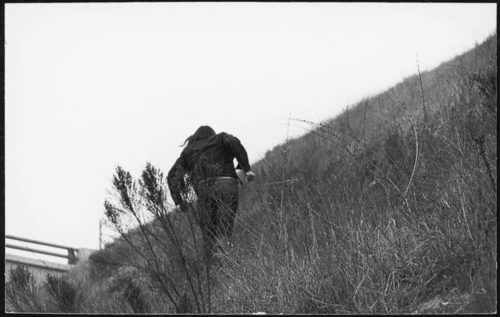
Alan Sekula, photography.
Now, western science has two basic ideas about consciousness. I will quote Subhash Kak here:
“Metaphysics = classical logic. Human behaviour will turn out to be completely describable by classical logic. Consciousness will be seen as an emergent phenomenon, somehow related to the complexity of the human brain. This is the orthodox view of reductionist science, but recent research mitigates against this view.{ } Metaphysics = quantum/classical logic. The neural activity in the brain is held together by a quantum field that endows consciousness with a unity. This makes the brain a hybrid quantum/classical machine. It also suggests that computers will never have consciousness since they do not work on quantum logic. *The heart of metaphysics is quantum logic* is the view that has been espoused by many prominent contemporary scientists. Metaphysics cannot be reduced. Current science cannot explain consciousness. Because, if it could, then consciousness would be reduced to a “mechanical” response and we would all be zombies!”
(Swarajya, 2016)
It should be clear that consciousness is always going to be elusive. If you read the second approach, above, you realize that, by the logic of quantum physics, even if you COULD identify and somehow use a quantum field in your search for *mind*, the result would answer nothing. Description, regardless of how detailed, is not explaining consciousness. So, perhaps the problem is with the words being used. Let’s start with *consciousness*. Much like definitions of time, there is a gaping problem.
The Oxford English Dictionary defines consciousness thus: “Internal knowledge or conviction; the state or fact of being mentally conscious or aware of something.”
Then we have the word *explain*. Oxford English Dictionary : “…to tell someone about something in a way that makes it easy to understand.”

Juan Gris
One is stopped right at the start then. But this is a perhaps puerile approach. And to approach this philosophically means, I think anyway, to try to strip away the confusions and linguistic traps. And then to ask if its at all important to define anything. And what does THAT mean. (Oxford says “an explanation of the meaning of a word or phrase, especially in a dictionary”.) We are going in circles. So, maybe the best way to try to at least find a singpost, metaphysically speaking, to these questions is start with death.
Now, let me backtrack a moment here. I started this blog post because I had started to wonder, at the age of 71, how it is that most of humanity never stop, during their day, or anytime really, to ask questions about life and death. Why aren’t we all talking about this all the time? Bukowski once said; “We’re all going to die, all of us, what a circus! That alone should make us love each other but it doesn’t. We are terrorized and flattened by trivialities, we are eaten up by nothing.”
I always remembered that. Not only should we love each other but we should stop most of what we are doing and sit down and at least discuss our inevitable death. And so, I thought, well, I remember I did at one time have such conversations. A lot, in fact. I was in my twenties. In NY mostly but in LA too. Sometimes with a tab of LSD. Those people I knew then are all dead now for the most part (Not from LSD so far as I know). And I don’t find that same curiosity anymore. Not about existential questions. Even during the lockdowns few people seemed to want to discuss the nature of mortality. Or, by extension, to ask of any of countless basic questions of life and reality. Of consciousness. I suspect people do think about much of this, privately, silently. But so denuded is contemporary culture, contemporary socializing, that there is a fear about talking of such things. There is a fear in talking, period. I could be wrong, of course, and maybe it’s barely thought about at all, aloud or silently. I know people who will discuss politics seriously, but rarely questions of time, or consciousness, or death. Perhaps it is too intimate. There is also no conversational entry; hey man, hows the kids? Infinity, can I ask you something about that? Now, even the scientific community, at its further most edges, meaning quantum physics, is still somehow avoiding issues of all things spiritual. It is approached, certainly, but it is a math problem, mostly. It is impartial, or impersonal I guess.
The loss of radical political expression in the arts coincided with the loss of spirituality and with the loss of an avant-garde. The culture today is subsumed by corporate culture (sic), and this starkly defines the loss of working class artists. Darel Paul has an essay on wokeness that touches on many things but what he describes here is crucial to understanding the climate created by a highly affluent white corporate sensibility. And it is seen, perhaps, most acutely in the culture industry itself.
“…woke capital is hardly an anomaly to what is characteristically American. In fact woke capital is the epitome of two intertwined developments in the American political economy since the 1960s: globalized corporate power and a national therapeutic culture. The first is uncontroversial enough that I think it needs no elaboration here. Regarding the second, narratives of suffering and healing, of authenticity and liberation, of self-care and self-actualization, overflow the fields of psychiatry, psychology, and counseling to fill schools, churches, corporations, and the state. It stands today as our national collective moral philosophy. Thus woke professionals and managers exercising power through woke corporations find a welcome home in this wider therapeutic culture. Victimhood ideologies are layered on top of this therapeutic cultural base, identifying specific groups owed particular cultural recognition and reparations for the harms they have suffered.”
Darel E. Paul (Woke Capital in the 21st Century)
Woke culture is anti-existential. It is also distinctly class defined. And the cultural parameters and codes of woke capital bleed into nearly all fields, including science.
“But let me just mention one as an example: the principle of precedence. So this is an idea about quantum mechanics, and the idea starts like this: In physics, if you repeat an experiment—if you set up the same initial conditions for the same system, you get the same response. Now, in classical physics, there’s a deterministic prediction of what the response will be. In quantum mechanics, there’s a statistical distribution of possible responses for the same preparation of the system. So, why is that? Well, the traditional view would say that there’s a timeless law, and the timeless law applies each time you prepare a system the same way, so since the same timeless law applies, the same outcome applies, whether it’s a unique, deterministic result or some statistical distribution of outcomes. But it turns out that you can actually explain the fact that the present is like the past in a more economical way without having to posit a crazy metaphysical notion like timeless laws. Supposing what happens when you present nature with a choice—you prepare a system and then make an experiment, presenting nature with a choice about how it will respond—she looks to the precedents in the past and sees how she has responded before to similar challenges, to similar circumstances. Now suppose that the only law is that nature picks randomly from the past precedents. And this would explain why the statistical distribution of outcomes of similar experiments are preserved over time.”
Lee Smolin (Interviewed by Howard Burton; Examining Time)

Yuichi Hibi, photography.
Now, the above is a very odd paragraph (among many odd paragraphs in that book) because of the anthropomorphism. I’m sure it seems less silly when expressed in mathematical equations. But maybe not. One problem is that, essentially, Newtonian language is being used. And the endowing of nature with personality and agency. With ‘consciousness’. It is almost a woke physics.
And Newtonian language, as it were, is Christian language, and it is marked by presumptions regarding a linear time progression that culminates not in death but in eternal life.
Most children discover (from parents often, or at school) that the sky goes on forever. For if it stops, what is beyond it? Then comes later tutoring that actually space is curved. And on and on. None of it breaches that closed box of language. No, the portal to those infrequent glimpses into something on the other side (sic) of the box come from art, philosophy, drugs, or just silence and solitude. But western society has, today, developed a fear of revelation.
I remember Jonathan Franzen (I think it was him) who said Fred Astaire was the greatest artist of the 20th century. Yes, this was just Franzen wanting attention, but it was also representative of the pandering to entertainment that seems to have found an unassailable traction in western culture today (and nothing against Astaire, who I have never quite ‘got’ but who I respect).
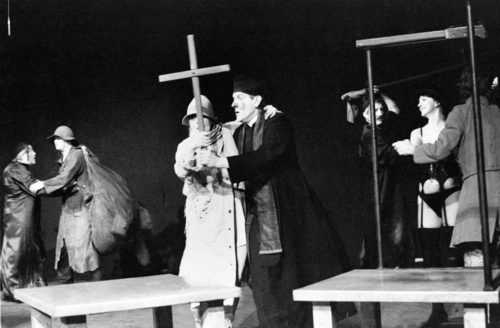
Cricot2 production of Wielopole, Wielopole. (Krakow 1979)
Philosophy is not entertaining. Which is why post graduate enrollment in philosophy departments keeps dwindling. And I consider the study of classics as philosophy. Art is, too, even, in most respects. Theatre, the ur-art form is a philosophical laboratory. The greatest theatre artists of the 20th century all knew this. Beckett, Peter Brook, Pinter, Genet, Artaud, Kantor, Foreman, Blau, and Grotowski. Throw in Heiner Muller and certainly Handke. In all cases this was a search for revelation. Growtowski probably needs an asterisk because his later years saw something strangely anti-mystical occuring. The heir in Polish theatre is Krystian Lupa. I’ve never quite known what to think of Lupa. And the last in-person performance I saw was twenty years ago in Krakow. And it was both impressive and irritating in about equal measure. But it was certainly not entertaining nor did it pander to the audience ( Lupa reminds me a bit of filmmaker Alejandro Jodorowsky. The Chilean/French director of El Topo and Santa Sangre, and the John Lennon financed Holy Mountain, who was always more posture than substance { actually he is still alive and in his mid 90s}. Still, I suspect Jodorowsky was a legitimately serious artist, in some sense anyway). Maybe because Lupa and Jodorowsky are both Jungians. Jung is not a great influence on artists, by and large. Or rather, most artists, who are only superficially Jungian anyway, because Bly, for example, did quite well with Jung. Let’s say Jung ‘can’ be a bad influence.
Polish theatre has had a long tradition of monostarial communal belief. From Juliusz Osterwa to Growtowski to Kantor, to Witkiewicz. Probably original Noh theatre carried that idea with it, too. Some Indian disciplines, too. Specifically this idea is one of retreat. And today, I find this more and more significant, actually. There is a dialectic with retreat, however. How does retreat not become avoidance? Western practitioners of Eastern disciplines tend toward the facile and superficial. Not all, mind you, and I have friends who are quite serious. The facile are ones who use it to avoid the political. When ‘letting go’ is its own form of ‘clinging to’.
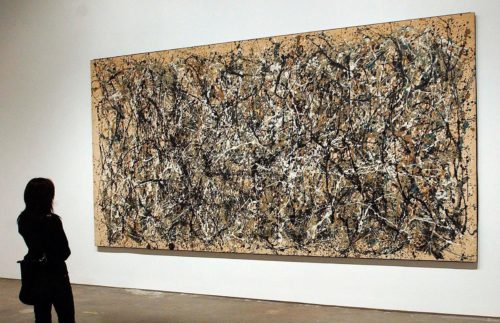
Jackson Pollock
Now this monostarial aspect to Polish theatre is important because while Julian Beck managed it, to a degree, with The Living Theatre, others like Foreman or even the late Reza Abdoh struggled with forming that level of commitment in actors and designers et al (Foreman came close). I always wanted my groups to coalesce into something Cricot like, but I was in Los Angeles. A less monostarial city would be hard to find.
A recent article in The Guardian points up another aspect. https://www.theguardian.com/culture/2022/dec/10/huge-decline-working-class-people-arts-reflects-society

Edward Kienholz (Detail)
You cannot sit and look at Rothko, or Pollock, or Agnes Martin, or the sculpture of Serra or Louise Nevelson, and not feel this search. Now, the other problem that coincides with the academic/corporate infestation of culture overall, is the preponderance of bad art. The erosion of public education is certainly part of this. One used to get cursory exposure to Beethoven or Bach, to ballet maybe, or at least one semester of art history. You would learn what the Renaissance was, for example. You might be shown the paintings of Titian or Rembrandt. Now that was pitifully small, and often with teachers who knew little themselves. But it more than most students get today, and looking back I now think it was profoundly important. Most students didn’t care but some, one or two a year, would start to read more on Bernini or learn who wrote the Ode to Joy. was. I remember we were assigned The Scarlet Letter. A minor book but it led me at the age of sixteen to Melville. And Melville changed my life.
If one looks at Homer, the two epic poems The Iliad and The Odyssey, you have what are really the assemblage of a hundred years of oral tradition, stories, told in various dialects from the entire Greek speaking world, put into a new literary form. And that form is, strangely, something quite apart from what both poetry and prose writing (fiction) were to become by the modern era. The Iliad is really a extended short story less about the Trojan War and more a study of two of the Greek leaders, Achilles and Agamemnon. And in that sense it is later echoed in Shakespeare’s *history* plays. The point here is only that these poems are so fundamental to western thought, to the inherited assumptions of character, and ideas on courage and ethics. Fundamental to how we think. The cancelling of Homer, which has happened in the U.S. is societal self harm.
Bachelard said someplace (in criticizing public education) that teachers replaced discovery with lessons. That total ignorance was better than knowledge that had forgotten its first principle. And that the path of learning is more important than results. In a science (he says) where new discoveries are almost entirely found in the discipline of math — children must not have their creative imagination crippled. (what that first principle might be is something left irritatingly vague…but more on that below).

Bill Owens, photography.
Now contra Bachelard is cosmologist and astrophysicist Katie Mack.
“As a discipline within physics, the study of cosmology isn’t really about finding meaning per se, but it is about uncovering fundamental truths. By precisely measuring the shape of the universe, the distribution of matter and energy within it, and the forces that govern its evolution, we find hints about the deeper structure of reality.”
Katie Mack (The End of Everything)
The epistemological aspect of quantum theory and cosmology is very interesting. Katie Mack is a very good writer for the lay (not math) reader. And because she is good, the epistemological problems with current cosmological theory are starkly revealed. Take the *beginning* of the Universe idea. Or let’s take just one aspect. The idea is that we live in this galaxy, among billions (hundreds of billions) of other galaxies. And the light we see from distant galaxies is tens of billions of years old. Beyond this is the area the Hubbel deep field telescope explored and then beyond THAT is what the Hubble ULTRA deep field telescope explored. And it is this area that starts to inch back (in time) to the beginnings of the Universe. An area of first stars, then an area, even darker, of perhaps just radiation, and then finally the speculative realm of deep time at the start of it all. And the image Mack (and her associates in cosmology) provide is that in this very distant deep time realm is a sort of shell of fire surrounding everything. And this is because the early universe was much hotter and much denser. And as the Universe is expanding, this hot and dense (there is a bad joke in there about how I like my women, but never mind) early universe is referred to the dark ages, or (sometimes beyond even that) the Radiation era. Mack refers to it in a speech as Primordial Fire . The *Big Bang* (which wasn’t apparently a bang exactly but more like an instantaneous expanding of radiation and, well, whatever). Now the problems here are obvious. This is a story. A compelling story because we have been taught to believe in science. It’s a science story. Not some myth invented by ‘primitive people’. (it is a modern scientific myth)
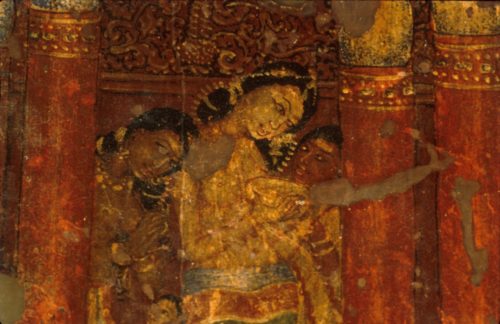
Ajanta fresco. 2nd century BCE. Abhishek,Mahajanaka Jataka.
The other question, vis a vis, Mack, is how the Universe ends. There are a number of theories. The Big Rip, Heat Death, Vacuum Decay, and etc. What is relevant here is that in all cases the idea of time looms over the entire discussion. The end of each scenario is trillions of years away. Or, hundreds of billions in some cases. And suddenly the epistemology of cosmology becomes contested, in a sense. (Mack has noted how the idea of *now* is meaningless when these theories are worked on). Because a hundred trillion years has no real meaning. Humans came up with this measurement of a thing they also created, called time, but applying it to cosmic activity becomes oddly empty. Also, remember (and Mack mentions this in passing) that the universe is 80% dark energy. Nobody has any idea what dark energy is, or if it is anything. Except that most of the Universe is made of it. Then a big part, a third, is dark matter. And, really, this is barely understood at all. Then you have 5% of the universe made up of atoms, in other words that on which the standard theory is based. That on which the Hadron Collider is predicated. Five percent.
Now when discussing the end of the universe, several things are implied. Why is the end so disturbing, firstly? Well, what is ending exactly? Everything is the answer, but that feels incomprehensible. To each individual, this is a form of death. And death is feared, when it is feared, because it means an end to consciousness. The end of the Universe is also the end of consciousness, just not our individual consciousness, but all consciousness. It also carries a troubling sense of how meaningless everything is because it will one day, presumably, disappear.
A very particular problem with all of this has to do with space. Or rather space-time, per contemporary physics. When cosmologists and astronomers ask what is the shape of the Universe, or is it closed, flat, or open, the same incomprension occurs. (this becomes even more pronounced in string theory discussions where literally nothing being talked about has any relation at all to the *real* world). And nothing, really, can be right or wrong.
“The present-day observable universe is probably bigger than you think. The “observable” part refers to the region within our particle horizon. We define this as being the farthest we could possibly see, given the limitations of the speed of light and the age of the universe. Since light takes time to travel, and more distant objects are, from our perspective, farther in the past, there has to be a distance corresponding to the beginning of time itself. A distance at which, if a light beam started there at the first moment, it would take the entire age of the universe to reach us. ”
Katie Mack (Ibid)
But since the Universe is expanding, the light from the most distant galaxies today will never reach us — the expansion is moving too fast. In fact it is moving faster than the speed of light. (So I am told). Eventually, in this theory, the expanding universe will result in totally empty skies. Of course everything will be cold and dead by then anyway. There are a number of paradoxes in this, for example the fact that at a certain distance objects (galaxies) appear larger and not smaller. This is because they were closer when their light was sent us.

Tian-yuan-fa-we (astronomical studies compiled by Bao Yunlong, Song Dynasty)
“So beyond a certain point, the balance between “the universe was smaller in the past” and “light takes a certain amount of time to get here” is such that a galaxy that is more distant than another galaxy now might have actually been closer when its light was emitted.”
Katie Mack (Ibid)
In the expanding universe theory, the further apart everything is from everything else means less influence from one thing onto another. And eventually as this influence lessens, galaxies and stars grow faint and finally die. Even black holes will shrink and cease to exist. For nothing alone (and everything will be, in essence, alone) survives for long. Not even particles, not even the never actually seen electron. It will all erode and die. Nothing will be left.
I want to mention a couple other things quickly regards cosmology. First is something called *statistical mechanics*. This is really what an infinite number of monkeys at an infinite number of typewriters will eventually write Hamlet thing is all about. (or if you waited a trillion trillion trillion years one could see a piano spontaneously assemble itself in a box …etc). Another thing worth noting here is symmetry. And symmetry is found throughout various psychical sciences. And in math. The periodic table, in geometry, etc. The universe seems made up of rather beautiful and uncanny symmetries. And if you think of this in terms of the Big Bang (or hot dense sort of bang) and wonder, whether the origin of the universe was caused (more on that) by inflation or the bounce theory, or is cyclical/reversable (or etc) the fact is there WAS a starting point, and there was a nano second, or a billionth of a nano second before it all came into existence, and ponder why it would come into existence symmetrically. Would contain such remarkable symmetry and order. Which segues to the topic of entropy. All existing theories about the origin of the Universe imply a remarkably low order of entropy to begin with. Something I don’t quite understand to be honest. But the point really is that when one thinks of the ‘start’ of this already incomprehensible cosmos, nearly anything seems incomprehensible. One simply cannot relate, except in the most abstract sense, with the idea of trillions of years. Or, of whatever there was or wasn’t before matter and the cosmos.
Which brings us back round to time. When you read anything by quantum theorists you run into a debate about what is *real*. And this is because quantum thinking requires potential results from potentially real questions about potential problems in math equations. As it were. And I remain largely suspicious of quantum theory altogether, I have to say. And partly this is because I find myself forced back to Vedic rituals, and Hindu mystics, and to Freud and Wittgenstein. The latter would immediately interrogate the language being used. What the word *real* means for those using it in such contexts.

Ad Reinhardt
Humans explain the world, the cosmos, with stories. Even pure math is a story. And stories use language. And language is embedded with history. Human history.
There is a quote at the beginning of Calasso’s Ka:
“The world is like the impression left by the telling of a story”.
Yogavāsiṣṭha, 2.3.11
I’m going to go out on a limb here and say I’m pretty certain sea sponges do not contemplate black holes or the death of white dwarf stars. And we, as a species came out of that same microbe soup that sponges and coral came from. And shrimps. And it’s just they, as a species, decided to stay there. Now it’s not quite that simple, of course. But my point here are touched upon by Mack in her epilogue to above quoted book.
“The universe will, more likely than not, fade into a cold, dark, empty cosmos, and all that we’ve done will be utterly forgotten. Where does that leave us now? Hiranya Peiris sums it up in one word: ‘sad’.
‘It’s very depressing,’ she says. I don’t know what else to say about it. I give talks where I mention that this is probably the fate of the universe, and people have cried’.”
Katie Mack (Ibid)
So, several things here I want to touch on; first is that geometry, or any math, calculus, any of it, can be beautiful. I get that. Its transcendently beautiful. The Golden Ratio and Fibonacci numbers, these are amazing properties. See, my most religious moment comes when I think, well, if I pick up handful of wet sane and hurl it at the wall, I do not get a perfect nautilus shape, I do not get the image of an anything except a mess of wet sand. It feels chaotic. If I spill my bowl of soup, it does not reveal unity or symmetry on the floor. So, how did in that billionth of a nano second before the hot dense money shot occur did such extraordinary unity come into being? Or, perhaps the spilled soup does reveal extraordinary symmetry and organization but I cannot see it. But see, that is the answer to a question that is itself deeply flawed. It is just that one cannot probe the depths of the most profound of questions given the tools we have. If the secret meaning of the Universe were revealed to me, in private, and I wasn’t allowed to share this meaning, then how could it be meaningful? Or, is that the wrong way to think about it? And here, again, we run into the hard consciousness problem. Or at least the hard consciousness question.
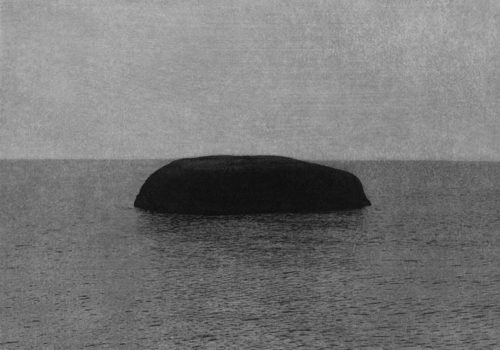
Jungjin Lee, photography.
Perhaps it would be meaningful, even if I died alone with this secret meaning. It would depends on the meaning, I suppose. But there is no version of cosmology that is not an allegory of ourselves. Eventual *Heat Death*, an empty cold expanse of nothing is terrifying because in some versions of my private ruminations that is what my own death looks like.
All of art, probably, is a striving for immortality. Even our legal system, the invention of inheritance, is a way to live on after death. And I think, largely, AI is a denial of death project. At some point, perhaps the Enlightenment, science brought on board ideological baggage. The very desire for neutrality is itself ideological.
“…the golden age of positivism, where Man is no more than physics plus chemistry, and consciousness is a byproduct of the higher functions, something nobody has time to be bothered with.”
Roberto Calasso (Literature and the Gods)
And the cosmology of astrophysicists is one in which the human is either missing, or simply a spectator. What exactly does string theory hope to explain? On the one hand, the admittance that dark matter and dark energy make up the bulk of the Universe and nobody has any idea what they are is a very troubling idea. But it is not the part that really troubles me. What troubles me is that all of this math, all of this science, all of the money and energy and time (sic) spent on the Hadron Collider, on massive telescopes and satellites does not even pretend to care about WHO is doing this stuff. Mack’s epilogue is very honest in that she tries to understand this study of hers, to understand her field of study, and how it seems to provide no insight into death. Our death, her death. And that the fear of death is that this thing ‘consciousness’, like dark matter, cannot be explained at all.

Louise Nevelson
That is remarkable to me. The world, or perhaps better, ‘reality’ is given to us, revealed to us, by studies that are intentionally impersonal. The world is now what science says it is. And yet, the story of contemporary cosmology is nakedly a myth. That the very outermost reaches of earliest deep time (and space) is referred to as a primordial fire suggests this most obviously. Gaston Bachelard writing of man seated before a fire….
“In these circumstances the reverie becomes truly fascinating and dramatic; it magnifies human destiny; it links the small to the great, the hearth to the volcano, the life of a log to the life of a world. The fascinated individual hears the cali of the funeral pyre. For him destruction is more than a change, it is a renewal. { } Death in the flame is the least lonely of deaths. Ie is truly a cosmic death in which a whole universe is reduced to nothingness along with the thinker. The funeral pyre accompanies him in his passing.”
Gaston Bachelard (The Psychoanalysis of Fire)
In Louise Nevelson’s work, there is mostly either sculpture in black, or sculpture in gold. The black is the end of the world, the charred cinder remains of a planet consumed by a dying expanding gaseous sun. The gold is the birth of time. That unmotivated instant of sudden existence. Ad Reinhardt’s black paintings are many things but one of the things they are is end times. His red canvases are the young cosmos. Everything is allegory. And this is one of the reasons I still think Norman O. Brown’s Love’s Body remains such a spectacularly brilliant book. It is why Calasso remains important ( I only learned recently that Calasso died last year).
“The real apocalypse comes, not with the vision of a city or kingdom, which would still be external, but with the identification of the city and kingdom with one’s own body.”
Northrup Frye (Fearful Symmetry)
“Every struggle against the sexual impulses must then be symbolized by a struggle against fire. A great number of texts could easily be found in which the demoniac character of fire is either explicit or implicit. The literary descriptions of hell, the engravings and pictures representing the·devil with his tongue of fire, would provide grounds for a very clear psychoanalysis.”
Gaston Bachelard (Ibid)
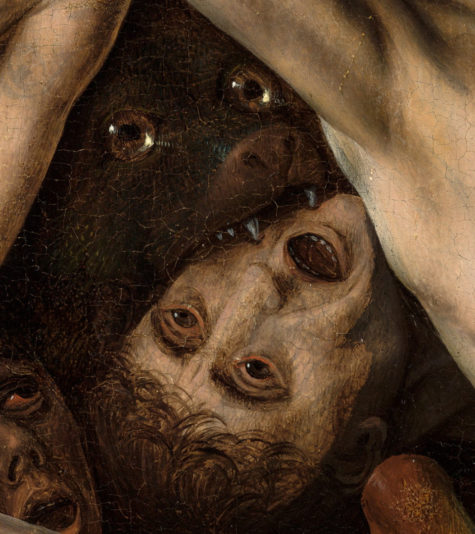
Dieric Bouts, 1470. (Fall of the Damned) detail.
Bachelard makes a very cogent point though, in recognizing the dialectical nature of fire symbolism. The end of the world is a world consumed with Hellfire. But fire also symbolizes purification. It deodorizes, it separates substances, and there are even agricultural fires to renew the land. Fire has, symbolically speaking, a secondary characteristic of renewal. It fuses, too, as with forges and smelting. But fire leaves ash. A remnant that keeps the purification from total completion. I think it interesting to look at theories like Black Holes. Hawking was keen to note the black hole has residual glowing. Even as it implodes in on itself. This is still alchemy in some respects. It does not invalidate the theory, exactly, but it points out again that even today’s cosmology is always a story. And almost always an allegory.
But fire is also the beginning of the world. The fire of purification. Northrop Frye’s study of William Blake has a relevant take on how Blake saw Milton, at least the Milton of Paradise Lost.
“Milton’s God, Blake says, is the real Satan, the prince of the power of the air, the creator of a physical universe which is the subterranean cave or hell of eternity. The real God dwells in the real Eden, a city of flaming fire. Milton’s Satan is Orc, the power of human desire which gradually and inevitably declines into passive acceptance of impersonal law and external reason. Thus Blake’s point is not that Satan is the hero of Paradise Lost, but that there is no hero of Paradise Lost.”
Northrop Frye (Fearful Symmetry)
“Our birth is but a sleep and a forgetting. The infantile amnesia is the birth of the soul, the dreamer; and we are obliged to repeat what we cannot remember. This world is repetition-compulsion, is karma: the burden of the past, a future determined by the past, causality. This world is dreams, the present transformed into the past, the shadow of the past falling on the present. The awakening explodes the cave of shadows; it is the end of the world.”
Norman O. Brown (Love’s Body)
Is the beginning the deep past? In today’s cosmologies it is. It is because of Einstein, also deep space. The further the telescope can ‘see’, the longer ago it is seeing. And at the very end is a light that can never reach us. But mathematics tells us it is there. It is strongly implied. It is a message sent too long ago and from too far away. The fall, today, is the unreturned email, the shadowbanned social media account. The fall is the insistence on banality. Learning that the US government created false accounts to propagandize and influence means nothing to most people. They are on social TO BE influenced, manipulated, which for them is to be taught. Instructed. No matter how secular, contemporary western culture is still Christian. It lives unconsciously in anticipation of the second coming. It is always unconsciously in crisis. It is always awaiting last days. This is partly the reason so much alarmist propaganda works.
The cosmology of Ms Mack, and the work on quantum theory, is largely a western (and mostly) white affair. The Hubbel telescope was built at Lockheed-Martin facilities. It is owned by NASA. The ‘science’ of deep space is driven by an arm of the defense industry,

Jasper Johns
“I believe that the blind-spot which posterity will find most startling in the last hundred years or so of Western civilization, is, that it had, on the one hand, a religion which differed from all others in its acceptance of time, and of a particular point in time, as a cardinal element in its faith; that it had, on the other hand, a picture in its mind of the history of the earth and man as an evolutionary process; and that it neither saw nor supposed any connection whatever between the two.”
Owen Barfield (Saving the Appearances)
The direction of western science remains one that is aligned with the same culture that justified slavery and colonial conquest.
“‘Now, one of the concepts that plays the greatest role in alchemy is that of the prima materia, the prime or basic matter, the one stuff from which everything else is made. People felt that if they could find out about that—and it is still a topic in modern physics—they could find the basic key of material existence’.”
Marie-Louise von Franz (Alchemical Active Imagination)
Dark matter is a prima materia. Dark matter and dark energy are treated as potential saviours for the field of cosmology, or least a kind of Rosetta stone. And quantum theory is largely about building models for various experiments at a sub-atomic level. Like AI, the computational dependency is acute. But there are hidden mythologies that surface repeatedly, in differing ways, throughout the cyber age. And the unconscious finds allegorical expression but it is mediated. If Pharaonic mummification was an alchemical search for immortality, or for an immortal body, the trans movement is not looking for life after death, it is looking for life as a new body. Or, revealingly, in the jargon of today, *in* a new body. In some way it is the anti-immortal body. Perhaps it is a Magical Body.

Eikoh Hosoe, photography
The drive for artificial wombs is another alchemy. The magic of birth becomes a technological dream of species immortality. One doesn’t need parents. One doesn’t need the body to create a body. And implied in this project is the eventual transplanting of intelligence, of mind, into an immortal machine body. Of course much of this is pure western misogyny and the erasing of the female. 3d printed food is another alchemy, too. Even when there is plenty of real food. There is an odd eroticized masochism in this. This drive to deny the binary feels allegorical, too. Artificial wombs, artificial food, artificial genders, artificial experience. For advanced capitalism has erased meaning. Desire is subsumed by surviving inner terrors. A climate of apprehension and fear suffocates the individual. Individuation is projected outward to the vaguest of ideological collectivities. A future that is delinked from the material world. Like quantum theory.
The positing of a Big Bang (or biggish bang, or just inflation trigger) also suggests that trillions of years later the radiation from this event continues to reach us. This is inheritance on a cosmic scale. This is psychoanalytically, uterine traumas continuing for the individual and expressed as symptoms, still, into old age.
“Capital, the dead past, employs labor, the living vitality and power of the present.”
Erich Fromm (Further Contributions to the Theory and Technique of Psychoanalysis)
“In keeping with its central function, the irreversible decline of the oath in our time can only correspond, according to Prodi, to a ‘crisis in which the very being of man as a political animal is at stake’. If we are today ‘the first generations who, notwithstanding the presence of some forms and liturgies from the past . .. , live our own collective life without the oath as a solemn and total, sacredly anchored bond to a political body,’ this means, then, that we find ourselves, without being conscious of it, on the threshold of “a new form of political association’, whose reality and meaning we have yet to recognize.”
Giorgio Agamben (The Sacrament of Language)
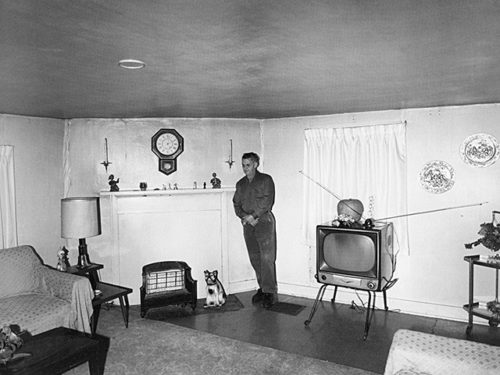
Chauncy Hare, photography.
.
To donate to this blog, and to the Aesthetic Resistance podcasts
https://soundcloud.com/aestheticresistance/podcast-75?si=af5463db1b9642f484721e8982c2b348&utm_source=clipboard&utm_medium=text&utm_campaign=social_sharing
use the paypal button at the top of the page.

Statistical Mechanics is really Thermodynamics
on steroids with a Quantum understanding. Or a long
meditation on the primeval fire. Being a departure
from Newtonian physics, Quantum Physics teases with
Existential Mystery while retaining a modicum of
bourgeois respectability or conventional sobriety.
But we have all become pragmatists today (ah, time
referent). Climbing over an infinite square well, tunnel
diodes’ electrons render possible much of electronics.
Because we are bodies, with concrete material needs, this
is of much significance to its credibility. I saw a Saul
Bellow documentary last night wherein one of his wives
left him whilr he read Kierkegard in a state of almost
existential despondency.
Thank you for another masterpiece.
I’ve met one or two people before in my life who always and in a special way inspired me to think. Broadly and deeply.
All of you at AR are like this, and John’s writings especially bring about this result, so I can’t just read them casually, they always engender this set of inspired ideas that I don’t want to conjure without recording or otherwise making use of them, and this last text especially resonates with me.
And thanks, I really needed this right now. It’s profoundly healing to think about these things with you guys, and it’s surprising that it sort of catches the same ideas which have been floating around on the peripheries of my mind. It’s almost like Jung was right. 🙂
“My concern though, is more with how humanity has, for the most part (and maybe nearly entirely) stopped asking questions about the basic mysteries of existence. The contemporary westerner is probably the least existential population in the history of the world.”
Denial of death, denial of mortality, denial of transcendence.
And contemporary biopolitics is utterly preoccupied with death-denial. This is really the core of the project as such. The entire depopulation agenda (as well as the climate crisis ideology) is for instance (ironically) an expression of the biopolitical objective of managing death and protecting contingent existence from its horizon of transcendence, from sacrifice, from this Kirkegaardian leap of faith and rite of passage that lies at the core of what it means to become human. And this presupposes will, agency, consciousness and real relation.
Interestingly enough, R. D. Laing remarks that the contemporary (well, 70s through 90s at least) expressions of psychosis are precisely the manifestation of our culture’s denial of these four basic realities in the existential experience of sensitive individuals. They’re afraid that they’re really dead. They’re afraid that they’re not real, or that other persons don’t exist. Or they’re afraid that they don’t actually have free will.
This also connects with Western science and philosophy’s reductive perspective on consciousness. Basically, I argue that the problem begins with a reductive naturalism united with early capitalism’s universal reification, and this in time produces the core outlook of the “modern” worldview, and the desire to “naturalize” consciousness, to reduce it to a function or a set of objective attributes at all costs. The Churchlands & Daniel Dennett go so far as to desperately deny the possibility of meaningful truth-claims if it means they can reject the reality of consciousness. I think this is remarkable.
And I don’t think people actually reflect about these things. They don’t have the resources. They don’t have the conceptual tools. They have no religion, they have no narratives that connect with these issues, and they have no aesthetics that approach them. You see this contrast in relation to certain subcultures, such as the black metal community, which consciously embraces magic, the occult, death, transcendence, existence &c, and this is in explicit opposition to the corresponding absence in the broader culture, where there’s this palpable fear of even thinking about death. One of my wife’s sister’s kids (20 years old) has expressed how she’s petrified at the very concept of death. No resources to cope.
“The loss of radical political expression in the arts coincided with the loss of spirituality and with the loss of an avant-garde. The culture today is subsumed by corporate culture (sic), and this starkly defines the loss of working class artists. Darel Paul has an essay on wokeness that touches on many things but what he describes here is crucial to understanding the climate created by a highly affluent white corporate sensibility. And it is seen, perhaps, most acutely in the culture industry itself.”
YES. Exactly this. We’ve gotta dig this up and dissect it thoroughly, because here’s a key pillar of the entire infection.
And it’s utterly brilliant of you to see the connection to victimhood culture here. It’s somehow also an expression of the anti-transcendence inherent to biopolitics, the fear of death manifest in the paradoxical lethal drive towards controlling contingent life… AI is of course at the heart of this. It’s the reification of consciousness, and at the same time a promise of safe death-negation without the need of sacrificial transcendence.
“It is hard; but the sort of compromise we are all hankering after is harder—in fact, it is impossible. It may be hard for an egg to turn into a bird: it would be a jolly sight harder for it to learn to fly while remaining an egg. We are like eggs at present. And you cannot go on indefinitely being just an ordinary, decent egg. We must be hatched or go bad.”
Because it’s precisely the desperate fear of letting go, the fear of control and the need to own and dominate life that renders victimhood culture so powerful, the victim’s psychological object loss is namely of the highest good, since there’s no transcendent view of things.
But then there can be no real courage either. There can be no real virtue. This following sentiment cannot be expressed within the framework of contemporary culture and irreligion, and maybe, just maybe that’s precisely why it’s the cure:
“I believed in God before I believed in heaven. And even now, even if — let’s make an impossible supposition — His voice, unmistakably His, said to me, ‘They have misled you. I can do nothing of that sort for you. My long struggle with the blind forces is nearly over. I die, children. The story is ending,’ would that be a moment for changing sides? Would not you and I take the Viking way: ‘The Giants and Trolls win. Let us die on the right side, with Father Odin.'”
And the key problem with “explaining” consciousness I think is simply that we presume reductionism as inherent to explanation. For classical philosophy, consciousness wasn’t really beset by any “hard problem”. It’s rather akin to an inevitable consequence of being as such, which ultimately is only explicable in terms of the transcendent.
I recently translated an interview/conversation between a choreographer, neuroscientist and physicist (all Colombian). I know, sounds like the beginning of a joke. Lots of interesting thing there, but to reduce to my point (!) there was a palpable difference between the two scientists in terms of expression and outlook; the neuroscientist was ebullient and in a weird way reductive, saying that every (human or perhaps animal) endeavor could be explained by neuroscience, including “spirituality” and perhaps that all of the soft sciences should be renamed to include “neuro” in the name, like “neuroanthropology”. I think he was in a way trying to justify neuroscience as a hard science, since in western thought the “hard sciences” are seen as more rigorous or demanding (read “better”). The physicist on the other hand, seemed weary. While he said “everything is physics”, he was (now that I’ve read your post and Johann’s comment), I think actually groping after something like “transcendence” in his explanations, but couldn’t quite let himself go there, instead falling on dark matter and dark energy to stand in for the mysterious or unknown aspect of life. And perhaps it does. If I have a point with that it’s that the ideas of physics almost beg for transcendence, for religion for lack of a better word. It perhaps is because of the hugeness of physics, we feel small and alone and (westerners especially) have low tolerance for uncertainty, bigness and mystery. That sounds a little like I’m saying religion is a comfort, but I don’t think that’s necessarily so. Although in the therapeutic culture of the US, it has become so. And that’s in part by erasing the suffering aspect, especially of christianity. The protestant project in a way began with capitalism and that’s a whole other conversation.
I come from a religious background so perhaps that’s always my take, although I rebelled. Anyway the question of death was always there—but always with the idea of the afterlife. And here was where it used to get interesting for me, because of the body. Our particular protestant religion didn’t believe in the last judgment & resurrection of the body like Catholicism, but inherent in the idea of the afterlife there was always a physical perspective. You are always somewhere, looking at things, feeling things. Even as a spirit or soul. I used to ask my mother questions about that & she didn’t really have good answers (who does). But it seemed clear that even incorporeality was obviously not without physical reference point. It’s interesting that in Commedia Divina, Dante has Virgil explain how it is that the shades in hell feel their torments, being but shades. And later, Beatrice explains the bliss in paradise. The former pain has of course, a lot to do with the idea of unrelenting, neverending spiritual torment too, Virgil says that the reason they’re in so much pain has more to do with the fact that they CHOSE to be in hell, and cannot unchoose it. Forever. (the opposite of the American idea/dream of starting over).
So there’s the physical torment but it is nothing compared to the spiritual torment. Later, I was learning about Buddhism and asked someone about the bardo. The bardo is where you see terrifying things just after death (put incredibly simply). He told me that one of the most terrifying things about the bardo is that you have NO physical reference point, so that there’s no way to react to the terrifying visions (I assume by fight or flight). That seems almost opposite Dante. But also if you’re seeing these things…then there has to be some kind of reference point. But I think my point is that the idea of consciousness without physical reference point is frightening, because it’s almost incomprehensible. Hence the vision of the death of the universe is almost incomprehensibly frightening, and depressing. Many religions have afterlives in which there is some idea of “body”…even if that idea isn’t well examined or explained (except by Dante). But then in the case maybe of something like ayahuasca visions, in which you are supposed to feel that oceanic feeling of…of what? Belonging maybe. Unification with the deity? I don’t know. That is an idea of no physical reference point that is perhaps blissful. Perhaps more on the hot & dense & close side of things (heh).
Anyway, thank you both for the conversations, on AR and here.
thanks. I did a good deal of meditation, sort of off and on, over thirty years. I could never quite stay with it the practice. I felt it was redundant. But some will accuse me of failing something essential in that. But i did have one moment, a half minute. ONCE. Out of all these years sitting. One. And I felt something enormously comforting, oceanic, integrated in a sense. And it was curiously without much image. I mean there were tibetan guides, etc etc. I wont go into it. But i felt, after that, of course there is something. There is already something and not nothing. That isn’t a question. But what that means in terms of death is still fraught with anxiety for me. But thank you for the comment. See, i feel this is such a good thing. And i know so so so so so many communists, socialists, of all stripes, who have taken refuge in cynicism. Its the place I always feel great disappointment in them-
A few of these things I talked about here https://whileican.substack.com/p/the-big-bang
excellent. Thanks, man. I like the no beginning, no end. For now…..:)
The big bang is of course what happens on ones wedding night, especially for those old-fashioned people (especially women) who “saved” themselves for this explosive moment
A course for a People for a People Without
Courses
You wake up, night having faded for now. You
do your customary and often customary functions, and,
maybe glance at the Sun &, then, get going at
last.
From then on, things loom better or worse depending
on how accurately you have found your path. Or
lost it.
Either way the approaching new rotation of our
Sun beckons.
Hi John,
I’m finally starting to look into the people that put together a podcast that probably restrains me from sliding too far into one dark side or another. Turns out my thoughts might fit in here, so a couple things that have been going through my head this year somewhat related to your piece:
1. I had some some fairly common legal trouble this year that still managed to be bizarre and to this day I am not sure if I was–not the victim, I’m passed that–the… if the conspiracy against me was of human or supernatural origin. Currently, my money is on supernatural forces that can easily be misidentified as terrestrial collusion because of the perverse mixture of human self-interest and not giving a shit, that pesky undecidability of whether it would be more gratifying to be willfully or passively cruel, oh well, it amounts to the same in the end, that is typical of how law appears to function.
Anyway, it was a real life mystery and I’d never thought like a lawyer and it was challenging to line everything up with my phenomenological experience… the best I can do to square everything legally and scientifically is to speculate that metabolism can be highly situational, which I’ve never run into before, so every way I parsed the material in a detailed and logical manner took me into some heretical statement with regard to officialdom, whether I was accounting for it in good faith or not. The experience itself was a much needed wake-up call but the conceptual quagmire it presented was an additional blessing.
I suppose I was feeding off this new found enthusiasm for investigating real stuff and finding weird problems (as opposed to the pointless anxiety of having to invent things whole-cloth that I inherited from my man Deleuze because of his own, retrospectively quite viable, deep-seated anxieties about newness) when a month ago I was like, maybe I can figure this virus stuff out, let’s start with the people that dispute that they cause disease, that’s pretty clear. And it sounds insane.
So, I was watching a documentary on terrain theory* when the word “ANTIBODIES” flashed on screen and I had a little gnostic or vipashyana moment of insight that was like, oh yeah this is a narrative.
And you peel it back and start looking at the history and it really is just like scopic drive man, i.e., technologically driven (fetishistic) fixation on finding the primary agent at a higher resolution, the theoretical equivalent of shopping for this year’s television. I’m looking at the etymology of the word pornography… is our account of viruses literally prostitution writing? One could develop that. It might take about 3 or 4 well-orchestrated detours…
So I don’t know… I’ve just been mulling that over, like many other things, the virus as a common cultural idea feels as if it has simultaneously preceded, reduced and had a whole life that is completely detached from its likely more modest, more diverse and still more mysterious protein and gene counterpart. It’s like the Coyote or Raven of dividuals that just kind of live in a network or whatever, except it doesn’t trick… it does the opposite. Even though we still have a hard time pointing to the damned things.
As an avatar for our comingling viruses come to meet us through transmission not unlike how our relationship with the natural world comes to visit us through emission. In other words through indirectly quantifiable abstractions the veracity of which must be persistently policed. Oh, there’s an oath one need not even assign their name to!
That’s not unlike where we ended up with vaccines, who’s safety and efficacy take on an ontological role that must be final, because they cannot under any circumstances admit that they have adverse effects, simply because of the legal culpability that would entail; thus the perhaps well-intentioned effort to protect individual health and liberties morphs into what may more or less truly amount to large-scale (mytho-poetic) fraudulence, because individualism and capitalism tend to coax out of their environment the most efficient pressures for maximizing unaccountability. I’m being generous of course. And in this way, the virus cultural projection really does leap far passed its protein and gene counterpart, which, after all, is self-limiting by nature.
*I really have to respect how confident and contrarian to what is apparently the most fundamental fact of our society, the terrain theorists are. The documentary itself was not much write about; but there was one other epiphany, when Dr. Cowan said with absolutely certainty that nobody needs to be scared of viruses as weapons, because that’s just not how they work. That seeded the idea that may have broke my proto-millenial slumber–that we could live in a mythology of fundamentally contrived and misdirected fear. More recently I realized that connected me to my past; in grad school I had a class with a member of the Critical Art Ensemble and their work on the uneffectiveness of biological weapons really puzzled me at the time, as I was seeking some kind of different aesthetic vanguard… WHICH I NEVER FOUND BY THE WAY!!
2. That ran longer than I expected so hopefully this will be brief. A homologous investigation I’ve been pursuing over the past few years is am I autistic or is culture? Or both?
This year I had a look at the Lacanian account in Leon Brenner’s “The Autistic Subject”. A kind of trivial, but I think very important thing that you get right off the bat is that autism originally contained within it a sense of “auto-erotic” and Freud was not happy when it started to be cleansed of this connotation. In my case, I would accept this label unequivocally, but I think it is an apt meaning to retain at scale in an atomized, technological, as Varun stated in a way that has stayed with me, “establishment facing” society.
The Lacanian origin of one’s “constitutive exclusion” cuts along traditional psychological boundaries of the schizo/autistic and the neurotic (the former reject entry into language and the latter pay their pound in flesh and are rewarded with the mechanism of repression), but calling attention to the auto-erotic component of autism can cut across a different line of our collective psyche by putting the autistic in relation to our fixation with the narcissist as a symptom of our fascination with technology. In this way we can see… something… perhaps it might provide a view where we can understand neurodiversity as a misdirection that obscures whatever this mnemonotypicality is that we can both take for granted and also be obsessed with (“new normal”, etc). I believe that’s called disavowal; in my self-investigation I believe I’ve found I can do repression, perhaps to some extent subconsciously, but it’s not as tightly woven into my experience as flat out rejection likely is. Disavowal, on the other hand… well it seems like just about anybody can do that. Hm.
I wonder if this one’s going to come together. Um, anyway, the autism stuff kind of directly relates to the oath thing, because one really helpful thing I gleaned from Brenner’s book, that has been personally helpful in my development, is the relationship between the autistic subject and the partial drive of the voice. All the drive stuff is confusing to me, and it does seem like the wild west of the field, but the take away is that the autistic individual runs into problems relinquishing control of the jouissance of their name to the Other. That is certainly my predicament, being born to be fixated on what the alcoholics, who are ahead on some of these things, call one’s “terminal uniqueness”–a uniqueness that is a structural impossibility (that’s why I never found that aesthetic), puts one in a position where to take an oath is to cede one’s birthright. This is a fundamentally autistic position, and I would go along with the fairly common consensus that it is a preegoic position.
From this position there is no death. It’s preliminary values are management and culpability, it’s causality mushy as it consists of narrow linearities punctuated by spontaneous butterfly effects of moralistic nearly supernatural violence, it’s cosmology concrete abstraction, consisting of gas and germ. The 21rst Century is Deleuzean, welcome to hell.
But to be a millenial existentialist one need only to risk death by choosing ego. In this one runs the risk of being a narcissist (okay it came together). But to do otherwise is simply, to take a phrase from contemporary spirituality that I’ve been meaning to dish out for a long time, theoretical bypassing.